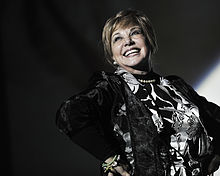music.wikisort.org - Singer
María Isabel Llaudes Santiago (born 4 December 1945),[1][2][3] better known by her stage name Karina, is a Spanish singer who had her biggest success in the late 1960s until the mid-1970s. She was born in Jaén, Andalusia to Trinidad Santiago and Salvador Llaudes.
This biography of a living person needs additional citations for verification. (June 2013) |
Karina | |
|---|---|
 | |
| Born | María Isabel Llaudes Santiago 4 December 1945 Jaén, Andalusia, Spain |
| Occupation | Singer |
Career
This section of a biography of a living person does not include any references or sources. (April 2016) |
After working in television for some years, she recorded her first album in 1964, which was especially successful in Venezuela. She became known to the Spanish audience in 1965 with a hit version of France Gall's "Poupée de cire, poupée de son". She also recorded a contemporary Spanish [or Portuguese?] version of the James Bond song Goldfinger. In 1966, she was awarded the Best Yé-yé Singer Prize. One of her films she starred in was "Los Chicos del Preu" (The College Kids) (1967). Her songs, like "Romeo y Julieta", "Las flechas del amor", "El baúl de los recuerdos", and "La fiesta" became hits in Spain.
She represented Spain at the 1971 Eurovision Song Contest with the song "En un mundo nuevo", where she placed second, bested only by Monaco's contestant Séverine with her song "Un banc, un arbre, une rue". After Eurovision she starred in the same-titled film En un mundo nuevo, which was inspired by her participation at the contest. At the end of the yé-yé years she moved to Mexico where she became moderately successful singing rancheras. She is still performing today.
Personal life
She has been married four times and has two daughters. In recent years, she was diagnosed with cancer but has since made a full recovery in the USA.[citation needed]
Discography
Selected LP
- 1966 "Karina Vol. I"
- 1968 "Karina Vol. II"
- 1970 "Karina Vol. III"
- 1970 "Colores"
- 1971 "Pasaporte a Dublín"
- 1972 "Tiempo al tiempo"
- 1972 "Lo mejor de Karina"
- 1973 "Lo mejor de Karina"
- 1974 "Lady Elizabeth"
- 1974 "Juntos para ayudarte"
- 1978 "Karina"
- 1985 "El disco de oro de Karina"
- 1991 "Soy como soy"
- 1995 "Primera época (1961–1964)"
See also
- List of yé-yé singers
References
- "Maribel Llaudés". los40.com (in Spanish). Retrieved 29 July 2010. [dead link]
- "Karina, la chica más yeyé" (PDF). eurovision-spain.com (in Spanish). Archived from the original (PDF) on 10 July 2011. Retrieved 29 July 2010.
External links
На других языках
- [en] Karina (Spanish singer)
[es] Karina (cantante española)
María Isabel Llaudés Santiago, conocida como Karina (Jaén; 4 de diciembre de 1946), es una cantante y actriz española. Tuvo gran éxito en los años 1960, 1970 y 1980 en España, México y en toda América Latina, con canciones como «Concierto para enamorados», «Luna blanca», «¡Oh, Carol!», «Ahora que estuviste lejos», «Ven, aquí siempre estaré», «Tú seras mi baby», «Las flechas del amor», «Romeo y Julieta», «El baúl de los recuerdos», «La fiesta» o «En un mundo nuevo», con la que quedó en segunda posición en Eurovisión 1971, lo que le permitió rodar su primera película como protagonista.[1]Другой контент может иметь иную лицензию. Перед использованием материалов сайта WikiSort.org внимательно изучите правила лицензирования конкретных элементов наполнения сайта.
WikiSort.org - проект по пересортировке и дополнению контента Википедии